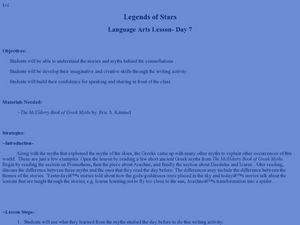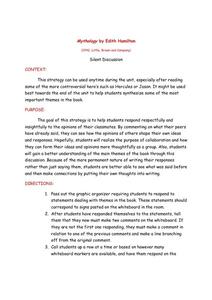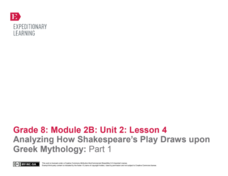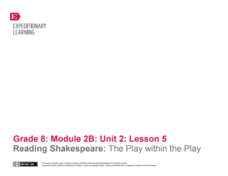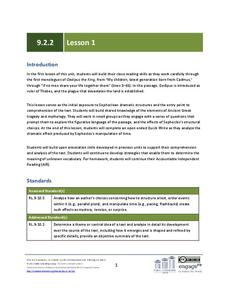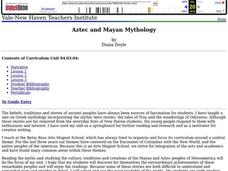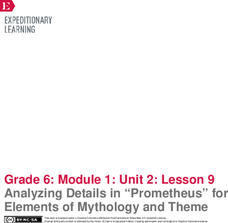Jefferson Township Schools
Note Card Assignment for Greek Myth
Your young learners will keep track of fifteen Greek gods and goddesses, such as Aphrodite, Poseidon, and Zeus, by creating notecards listing each of their names, titles, and symbols.
Core Knowledge Foundation
Greek Myths Tell It Again!™ Read-Aloud Anthology
A unity covers Greek mythology through read-alouds and activities. Fourteen lessons share a new story that pupils discuss, then complete word work and extension opportunities. Topics include the gods of Mount Olympus, Hercules, and more.
MENSA Education & Research Foundation
It’s Greek to Me: Greek Mythology
Designed as extension exercises in homeschool or classroom settings, as well as for individual work, the ideas in this packet are sure to engage learners in an investigation of Greek mythology.
Prestwick House
Edith Hamilton’s Mythology
Where is the Oracle? Who brought fire from Olympus? What creature is half bird, half horse? Review details from famous Greek myths with a crossword puzzle that focuses on Edith Hamilton's Mythology.
EngageNY
Analyzing How Shakespeare’s Play Draws upon Greek Mythology: Part 2
Pupils explore the narrative structure of a piece of literary text, mapping out the plot structure of the Greek myth "Pyramus and Thisbe." Next, they use their completed graphic organizers to write story summaries.
Curated OER
Legends of Stars
After choosing a figure from Greek mythology, middle schoolers design, draw, and color a constellation to represent that person. Additionally, they create a story to tell how the constellation came to be. This lesson is a great addition...
Walters Art Museum
Greek Mythology Family Tree
Just what every classroom needs—a poster showing the family tree of Greek gods, goddesses, and heroes. From Chaos to Odysseus both gods and mortals are featured.
Curated OER
Mythology by Edith Hamilton: Silent Discussion
Get everyone up and participating! High schoolers reading Mythology, by Edith Hamilton, complete a graphic organizer independently, and then record one of their thoughts on the white board for a silent discussion. Decide how you're going...
Have Fun Teaching
Compare and Contrast Greek Myths (4)
How are Icarus and Prometheus similar? How are they different? Compare any two Greek myths with a graphic organizer, which provides space for kids to fill in the ways that the myths are like and unlike each other.
EngageNY
Analyzing How Shakespeare’s Play Draws upon Greek Mythology: Part 1
Scholars read the story "Pyramus and Thisbe," analyzing word choice, tone, and meaning. They then try to find the gist of the story and discuss how Shakespeare used the myth in his play A Midsummer Night's Dream.
EngageNY
Analyzing How Shakespeare’s Play Draws upon Greek Mythology: Part 3
How do the narrative and play versions of the myth "Pyramus and Thisbe" affect meaning? Scholars reread Act 5, Scene 1 from Shakespeare's A Midsummer Night's Dream and compare its structure to "Pyramus and Thisbe." Next, they use a...
EngageNY
Determining Theme: Reading Myths in “Expert Groups”
Leave it to the experts. Scholars work in expert groups to analyze new myths. Each group is assigned to become an expert on either The
Fates, The Story of Medusa and Athena, or Theseus and the Minotaur. They answer questions and discuss...
EngageNY
Mid-Unit Assessment: Author’s Craft: Analyzing Shakespeare’s Craft: Part 2
Annoyed or bewitched—how does an author's word choice affect a text? Scholars begin the instructional activity by analyzing word choice in Shakespeare's A Midsummer Night's Dream. Next, learners take a closer look at the narrative...
EngageNY
Reading Shakespeare: The Play within the Play
Scholars continue reading the Greek myth "Pyramus and Thisbe," analyzing why it was written into Shakespeare's A Midsummer Night's Dream. Next, they complete a Venn diagram to compare the two texts.
EngageNY
Reading Closely to Build Background Knowledge: “Myths and Legends”
That is a myth! Scholars take a look at Greek myths referenced in The Lightning Thief. As learners listen to stories in Myths and Legends, they imagine the sights and sounds described. Pupils then talk with partners about specific words...
Curated OER
Greek Mythology: All in the Family
Twelfth graders compare/contrast the Greek myth to explain an aspect of nature. They create an explanatory myth about some aspect of nature and design a mythological business card using Microsoft Word.
EngageNY
Exploring Allusions to Myths in The Lightning Thief: Close Reading Part 1 of “Prometheus”
It's all just an allusion. Scholars learn the meaning of allusion and read an allusion in The Lightning Thief. Learners gather in their triads and discuss questions from the text to take a close look at vocabulary words and choose an...
EngageNY
What Makes a Myth a Myth? Comparing “Cronus” and “Shrouded in Myth”
Scholars complete a Venn diagram to compare and contrast Cronus and Shrouded in Myth. Learners work in their triads to write similarities and differences on sticky notes. They then take a look at the text The Key Elements of Mythology to...
Curated OER
It's Greek to Me!
Students explore Greek Mythology. In this Greek Mythology unit, students read myths, pantomime vocabulary words, practice research skills, create city-states, and demonstrate knowledge of ratios and proportions. This unit includes many...
EngageNY
Grade 9 ELA Module 2, Unit 2, Lesson 1
Delve into the heart of dramatic dialogue with a unit focused on Oedipus the King by Sophocles. Having completed an online exploration about ancient Greece beforehand, ninth graders read the play's opening lines and analyze how...
Curated OER
Aztec and Mayan Mythology
Here's a fresh take on a mythology unit. Use the myths of the Mayan and Aztec peoples of Mesoamerica instead of the more traditional Greek and Roman stories. This abstract suggests possible approaches and resources that can be used to...
EngageNY
Analyzing Details in “Prometheus” for Elements of Mythology and Theme
Well isn't that clever? Scholars read Prometheus, a tale describes the clever Greek god and trickster. They tune into details and complete graphic organizers that reveal the theme of the text.
EngageNY
Connecting Literary and Informational Texts: Cronus and “The Key Elements of Mythology”
Is there a connection? Scholars work to make connections between Myth of Cronus and The Key Elements of Mythology. First, they circle important words in the text and look for similarities. They then revisit the concept of theme and...
EngageNY
Building Background Knowledge: The Myth of Cronus
Scholars look at and describe a picture of Cronus and Rhea and discuss the process of making predictions. Learners then use the images to write a prediction about the myth of the gods on an index card before completing guided reading...







